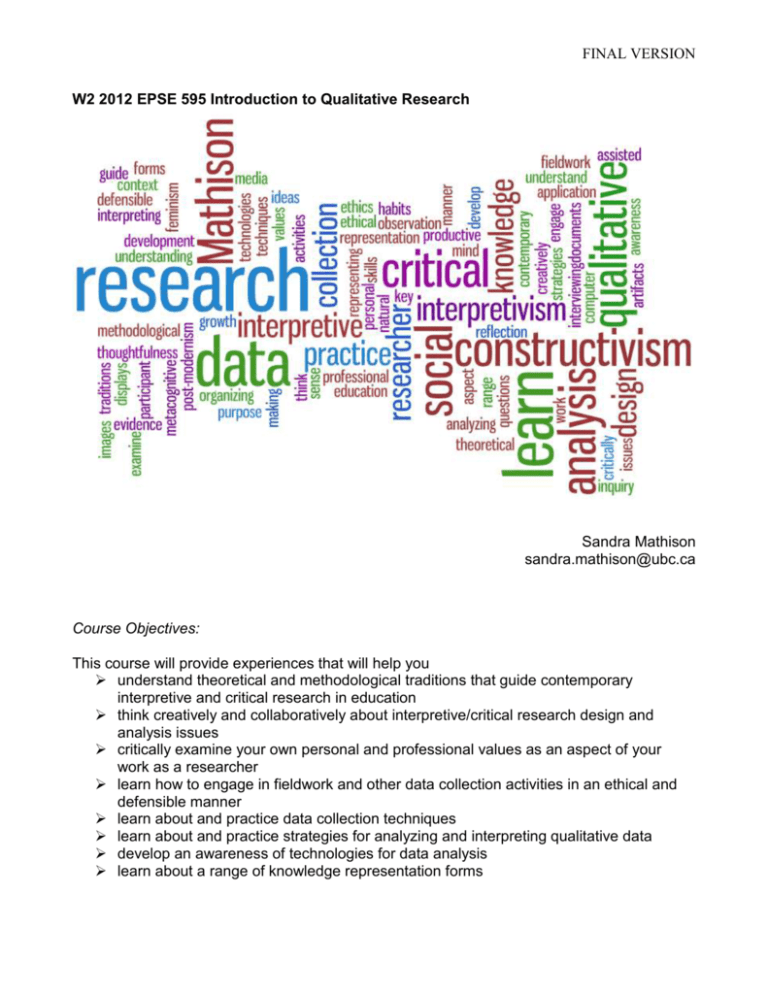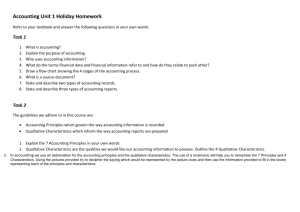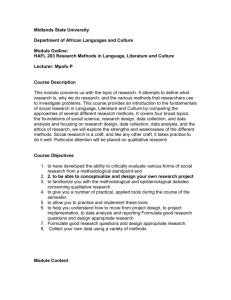EPSE 595 W2 2012
advertisement

FINAL VERSION W2 2012 EPSE 595 Introduction to Qualitative Research Sandra Mathison sandra.mathison@ubc.ca Course Objectives: This course will provide experiences that will help you understand theoretical and methodological traditions that guide contemporary interpretive and critical research in education think creatively and collaboratively about interpretive/critical research design and analysis issues critically examine your own personal and professional values as an aspect of your work as a researcher learn how to engage in fieldwork and other data collection activities in an ethical and defensible manner learn about and practice data collection techniques learn about and practice strategies for analyzing and interpreting qualitative data develop an awareness of technologies for data analysis learn about a range of knowledge representation forms FINAL VERSION What does the term ‘qualitative’ research mean? The terms qualitative and quantitative are commonly used to characterize different approaches to research. And this distinction often refers to a simplistic distinction between words and numbers. However, all research is potentially concerned with qualities and quantities and in reality these terms are inexact and do not communicate the most important characteristics of different research paradigms. This course will use the terms interpretive and/or critical research, which can be distinguished from positivist and post-positivist research. Required Books: Flick, U. (2006). An Introduction to Qualitative Research. Thousand Oaks: Sage. Pascale, C-M. (2011). Cartographies of Knowledge. Los Angeles: Sage. Pascoe, C. J. (2007). Dude, You’re a Fag. University of California Press. Other readings as assigned. You will find many additional resources on my blog, Qualitative Research Café, at http://blogs.ubc.ca/qualresearch/ Highly recommended: Schwandt, T. A. (2007). The Sage Dictionary of Qualitative Inquiry, 3 rd Edition. Sage Publishers. Denzin, N. K. & Lincoln, Y. S. (2005). The Sage Handbook of Qualitative Research, 3 rd Edition. Sage Publishers. Note about assigned readings: The readings assigned for this course are meant to stimulate your thinking about the research process. In general, the readings will be referred to although not necessarily discussed or explained in class. If the readings stimulate questions then you should raise them in class and/or write about them in your researcher journal. The readings are a stepping off point for the discussions and activities during class time. FINAL VERSION Course Requirements: 1) Participation (10% of grade) Students are expected to attend all classes, complete all assigned reading, and participate in class discussion and activities, including keeping a researcher journal throughout the course. The journal should be for your reflections, questions, ideas, and so on about interpretive and critical research, and you will be expected to write at least two journal entries per week. You should bring your journal to every class and I will periodically confirm that you are journaling about interpretive research. 2) Research Skill Workbooks (50% of grade; each workbook is worth 10% of grade) The workbook activities will be sent the week prior to when they are due. These activities are closely connected to the readings and class activities. Workbook #1 Epistemology & research questions due 30/1/13 Workbook #2 Participant observation due 27/2/13 Workbook #3 Interviewing due 6/3/13 Workbook #4 Found data due 13/3/13 Workbook #5 Data analysis due 3/4/13 3) Research proposal (40% of grade) due 10/4/13 Write a brief proposal (maximum 10 pages) for an interpretive or critical research project on a topic of interest to you. The proposal should include the following sections: introduction, methodology, research question(s), description of the context, and data collection methods and sources of data. (Use these as headings in the proposal.) The proposal should cite at least three references that you will build on in doing the research. The proposed research must include more than one data collection method. In general, I look for the following when grading student work: understanding and application of key ideas and skills thoughtfulness (evidence of metacognitive reflection and productive habits of mind) growth and development as a researcher All written assignments must be submitted electronically as a Word document or ppt document. Do NOT submit pdfs. Name your file with your last name and the assignment name, e.g. “YOUR NAME Workbook 1” The subject line of the email should be the same as the assignment name. Late work is accepted at my discretion. If you think you will be unable to complete the work on time you must contact me in advance. FINAL VERSION Course Schedule: Date Topic Readings 2/1/13 Introduction to interpretive and critical research FOUNDATIONS OF RESEARCH 9/1/13 Philosophical roots of qualitative inquiry Pascale, chpts 2 & 3 Flick, chpts 6 & 7 16/1/13 Qualitative research perspectives: symbolic interactionism, ethnomethodology, dialectics Pascale, chpts 4 & 5 Ollman, chpt 1 of Dialectic Investigations http://www.nyu.edu/projects/ollman/books/di.php 23/1/13 Research purpose, design, questions Flick, chpts 2, 5, 8 - 12 30/1/13 Reading interpretive/critical research Flick, chpt 28 & 29 Pascoe 6/2/13 Research ethics Flick, chpt 4 Freeman & Mathison, chpt 2, 3, 5 Tri-Council ethics guidelines, chpt 9 & 10 http://pre.ethics.gc.ca/eng/index/ RESEARCH METHODOLOGIES & METHODS 13/2/13 Participant observation Flick, chpt 17 Becker & Geer, Participant Observation & Interviewing 20/2/13 READING WEEK 27/2/13 Interviewing Fontana & Frey, Interviewing Flick, chpts 13 – 16 6/3/13 Material & found data Flick, chpts 18 - 21 Mathison, Seeing is Believing Prown, Mind in Matter FINAL VERSION DATA ANALYSIS & REPRESENTATION 13/3/13 Organizing and making sense of data Flick, chpts 22 – 27 Mathison, Why Triangulate? Ryan & Bernard, Techniques to Identify Themes 20/3/13 ****NO CLASS**** 27/3/13 Computer assisted data analysis, data displays Flick, chpt 26 Download and try out any of the demo analysis software versions 3/4/13 Representing knowledge Flick, chpt 30 Baff, Realism, Naturalism and Dead Dudes Sandelowski, Writing a Good Read Kadri Zald, Faces of the Homeless Baff, S. J. (1997) Realism and Naturalism and Dead Dudes: Talking About Literature in 11th Grade English. Qualitative Inquiry, 3(4), 468-490. Becker, H. S. & Geer, B. (1957) Participant Observation and Interviewing: A Comparison. Human Organization, 16(3), 28-32. Fontana, A. & Frey, J. (1994). Interviewing: The Art of Science." In The Handbook of Qualitative Research, 3rd Edition. Thousand Oaks: Sage Publications. pp. 361-76. Kadri Zald, J. (2004). Faces of the Homeless: A Photo essay. City & Community, 3(1), 29-41. Ollman, B. (1993) Dialectical Investigations. http://www.nyu.edu/projects/ollman/books/di.php Prown, J. D. (1982). Mind in Matter: An Introduction to Material Culture Theory and Method. Winterthur Portfolio, 17(1), 1-19. Ryan, G. & Bernard, H. R. (2003). Techniques to Identify Themes. Field Methods, 15(1), 85-109. Sandelowski, M. (1998). Writing a Good Read: Strategies for Re-Presenting Qualitative Data. Research in Nursing & Health, 21, 375–382. FINAL VERSION ECPS Departmental Guidelines: Plagiarism Plagiarism, whether intentional or unintentional, is a form of cheating that can lead to a failing grade for the course and to suspension from the University. As defined within UBC policies (http://www.vpacademic.ubc.ca/integrity/policies.htm), and as outlined in the UBC Calendar, plagiarism is a serious “form of academic misconduct in which an individual submits or presents the work of another person as his or her own”. As a form of intellectual theft, plagiarism involves taking the words, ideas or research of another without properly acknowledging the original author. Students need to become familiar with the many different forms that plagiarism can take, including accidental and intentional plagiarism. For more information see http://www.arts.ubc.ca/Plagiarism_Avoided.373.0.html OR www.library.ubc.ca/home/plagiarism/for-students.doc OR http://www.indiana.edu/~wts/pamphlets/plagiarism.shtml) Please take care to acknowledge your sources, including the Internet, using APA Style (American Psychological Association). Non-sexist Language Please incorporate and use non-sexist language [also called gender inclusive language] in your oral and written language. This language positions women and men equally, it does not exclude one gender or the other, nor does it demean the status of one gender or another. It does not stereotype genders [assuming all childcare workers are female and all police officers are male], nor does it use false generics [using mankind instead of human kind, or using man-made instead of hand crafted]. In addition, this language requires an attention to gender balance in personal pronouns, for example, use "he and she" rather than "he" or balance gendered examples in a paper, referring to both male and female examples. You may also recast subjects into the plural form, e.g., when a student raises his hand Š when students raise their hands. Person First Language Please incorporate and use person first language in your oral and written language. Disabilities and differences are not persons and they do not define persons, so do not replace person-nouns with disability-nouns. Avoid using: the aphasic, the schizophrenic, stutterers, the hearing impaired. Also avoid using: cleft palate children, the hearing impaired client, the dyslexic lawyer, the developmentally disable adult. Instead, emphasize the person, not the disability, by putting the person-noun first: the lawyer who has dyslexia, persons who stutters, the children described as language impaired, the teacher with a hearing impairment. Students with Disabilities We strive to include all students, including those with special learning needs in this course. Please let us know (or have the UBC Disability Resource Center let us know) if you have a disability documented with the UBC Disability Resource Centre and/or if you need any special accommodations in the curriculum, instruction, or assessment of this course to enable you to fully participate. We adhere to UBC Policy 73: Academic Accommodations for Students with Disabilities. This information is located at: http://www.students.ubc.ca/access/drc.cfm. We will respect the confidentiality of the information you share and work with you so your learning needs are met. FINAL VERSION ECPS Grading Policy Expectations Demonstrates exceptional breadth and depth of understanding of the subject matter; demonstrates proficient use of existing research literature and exceptional analytic and critical thinking skills, articulates ideas especially well in both oral and written form, consistently makes strong, explicit connections between theory and practice; shows a high degree of creativity and personal engagement with the topic. Grade A+ (90-100), A (85-89) Meets Expectations Demonstrates good breadth and depth of understanding of the subject matter; demonstrates good use of existing research literature and strong analytic and critical thinking skills, articulates ideas well in both oral and written form, at times makes strong, explicit connections between theory and practice; shows some creativity and satisfactory personal engagement with the topic. A- (80-84), B+ (76-79) Adequate Demonstrates adequate breadth and depth of understanding of the subject matter; demonstrates some ability to use existing research literature in general ways, and some indication of analytic and critical thinking skills, oral and written skills are adequate but need some work, occasionally makes connections between theory and practice, but ideas need to be developed further; few creative ideas and/or a low level of personal engagement with the topic. B (72-75), B- (68-71) Minimally Meets Expectations Breadth and depth of understanding of the subject matter are minimal; minimal use of existing research literature even in basic ways, and minimal indication of analytic and critical thinking skills, oral and written skills are barely adequate; minimal connections between theory and practice; minimal indication of creative thinking and/or a low level of personal engagement with the topic. C+ (64-67), C (60-63) Does Not Meet Expectations Breadth and depth of understanding of the subject matter are far from adequate; shows consistent misunderstanding of core concepts of the course; work is extremely deficient or sub-standard. F (<60) Outstanding





![July 31 Connect eupdate DRAFT [1]](http://s3.studylib.net/store/data/008100166_1-21bd0e395dcbfd67aaad5f18dd4ec08e-300x300.png)

